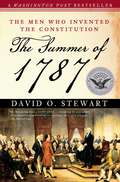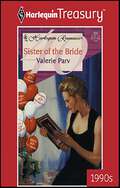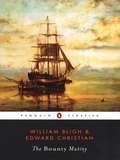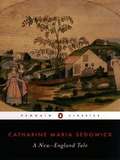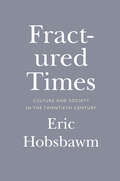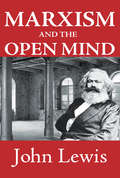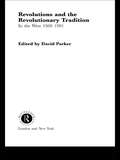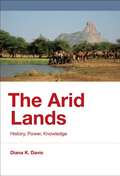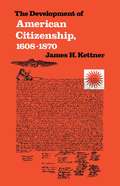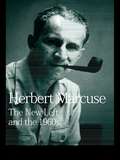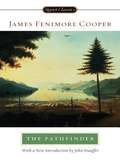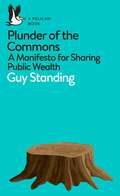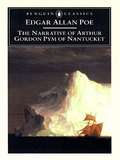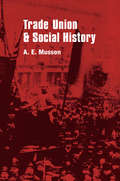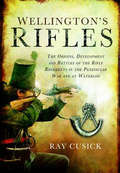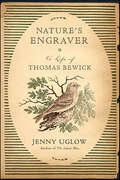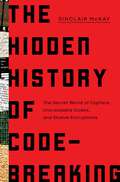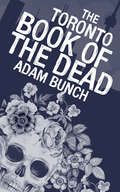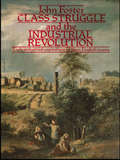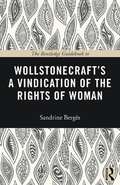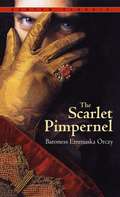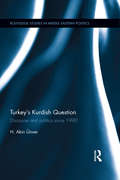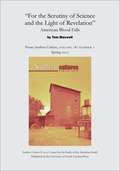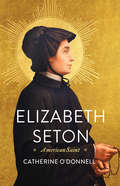- Table View
- List View
The Summer of 1787
by David O. StewartThe Summer of 1787 takes us into the sweltering room in which the founding fathers struggled for four months to produce the Constitution: the flawed but enduring document that would define the nation--then and now.George Washington presided, James Madison kept the notes, Benjamin Franklin offered wisdom and humor at crucial times. The Summer of 1787 traces the struggles within the Philadelphia Convention as the delegates hammered out the charter for the world's first constitutional democracy. Relying on the words of the delegates themselves to explore the Convention's sharp conflicts and hard bargaining, David O. Stewart lays out the passions and contradictions of the, often, painful process of writing the Constitution. It was a desperate balancing act. Revolutionary principles required that the people have power, but could the people be trusted? Would a stronger central government leave room for the states? Would the small states accept a Congress in which seats were allotted according to population rather than to each sovereign state? And what of slavery? The supercharged debates over America's original sin led to the most creative and most disappointing political deals of the Convention. The room was crowded with colorful and passionate characters, some known--Alexander Hamilton, Gouverneur Morris, Edmund Randolph--and others largely forgotten. At different points during that sultry summer, more than half of the delegates threatened to walk out, and some actually did, but Washington's quiet leadership and the delegates' inspired compromises held the Convention together. In a country continually arguing over the document's original intent, it is fascinating to watch these powerful characters struggle toward consensus--often reluctantly--to write a flawed but living and breathing document that could evolve with the nation.
Sister of the Bride
by Valerie ParvDeception...or desire?Terise O'Neill has a goal-revenge for her stepsister Clair's unhappy marriage. She needs to get close to Ryan Westmore, and a job in his home-as nanny to his and Clair's twin girls-provides her with the ideal opportunity.Close proximity to Ryan, however, reveals a very different man from the one Clair had portrayed. With thoughts of revenge fast receding, Terise is faced with a new challenge. How will Ryan react when he hears about her deception?
The Bounty Mutiny
by William Bligh R. D. Madison Edward ChristianThe names William Bligh, Fletcher Christian, and the Bounty have excited the popular imagination for more than two hundred years. The story of this famous mutiny has many beginnings and many endings but they all intersect on an April morning in 1789 near the island known today as Tonga. That morning, William Bligh and eighteen surly seamen were expelled from the Bounty and began what would be the greatest open-boat voyage in history, sailing some 4,000 miles to safety in Timor. The mutineers led by Fletcher Christian sailed off into a mystery that has never been entirely resolved.While the full story of what drove the men to revolt or what really transpired during the struggle may never be known, Penguin Classics has brought together-for the first time in one volume-all the relevant texts and documents related to a drama that has fascinated generations. Here is the full text of Bligh's Narrative of the Mutiny, the minutes of the court proceedings gathered by Edward Christian in an effort to clear his brother's name, and the highly polemic correspondence between Bligh and Christian-all amplified by Robert Madison's illuminating Introduction and rich selection of subsequent Bounty narratives
A New-England Tale
by Catharine Maria Sedgwick Susan K. Harris Emily Van DetteJane Elton, orphaned as a young girl, goes to live with her aunt Mrs. Wilson, a selfish and overbearing woman who practices a repressive Calvinism. In their rural New England village, Jane grows up yearning to break free from Mrs. Wilson's tyranny and find her place as a citizen of the evolving American Republic. She is helped by her encounters with characters who embody various shadings of moral, religious, and civic virtue: the affectionate servant Mary Hull, a pious Methodist; Mr. Lloyd, a kind Quaker; Crazy Bet, emotional, sympathetic, but deeply unstable; and Old John, bereaved but wise. Ultimately, A New-England Tale is about the connection between parenting and governing, and the key role women play in shaping a fledgling nation.
Como un sueño en un sueño
by Mina VeraUna nueva visión del mundo de los vampiros que te hará replantearte todas las ideas preconcebidas que tenías sobre una leyenda que podría ser más real de lo que imaginas. Es el día de Carnaval y Abigail acude a una fiesta de disfraces, donde debe recoger a la niña a la que cuida por las tardes para poder pagarse la universidad. El destino quiere que confunda la dirección y acabe en una fiesta que no tiene nada de infantil. En un ambiente decimonónico, conocerá a Elías, el cautivador hijo del líder del clan vampírico de la margen izquierda de la ciudad de Bilbao, quien la confundirá con una mensajera del clan que controla la margen derecha. Elías le entregará una crucial carta que puede suponer bien una alianza entre clanes o bien la guerra. Tras ser extrañamente embrujada por Elías, será interceptada por los Conciliadores, una organización secreta cuyo objetivo es mantener controlados a los vampiros bajo sus leyes. Max,el líder de la Sede de la ciudad, será el encargado de protegerla. A pesar de que su relación comienza siendo poco amistosa, pronto surgirá una poderosa atracción entre ambos y descubrirán que han nacido el uno para el otro. Pero su amor se verá amenazado por Elías, dispuesto a lo que sea para lograr que Abigail sea para él. Atrapada entre dos mundos, entres dos amores, Abigail deberá encontrar su verdadera naturaleza en su interior y luchar para salvar la paz entre vampiros y humanos, además de su propia vida y la de aquel a quien su corazón ha elegido como compañero para la eternidad.
Fractured Times
by Eric HobsbawmEric Hobsbawm, who passed away in 2012, was one of the most brilliant and original historians of our age. Through his work, he observed the great twentieth-century confrontation between bourgeois fin de siècle culture and myriad new movements and ideologies, from communism and extreme nationalism to Dadaism to the emergence of information technology. In Fractured Times, Hobsbawm, with characteristic verve, unpacks a century of cultural fragmentation.Hobsbawm examines the conditions that both created the flowering of the belle époque and held the seeds of its disintegration: paternalistic capitalism, globalization, and the arrival of a mass consumer society. Passionate but never sentimental, he ranges freely across subjects as diverse as classical music, the fine arts, rock music, and sculpture. He records the passing of the golden age of the "free intellectual" and explores the lives of forgotten greats; analyzes the relationship between art and totalitarianism; and dissects phenomena as diverse as surrealism, art nouveau, the emancipation of women, and the myth of the American cowboy.Written with consummate imagination and skill, Fractured Times is the last book from one of our greatest modern-day thinkers.
Marxism and the Open Mind (Routledge Library Editions: Marxism Ser.)
by John LewisIn Marxism and the Open Mind, John Lewis seeks to explain Marxism as a system of thought. In doing so, he addresses the studied neglect or grotesque misrepresentation that he feels characterizes Western attitudes toward Marxism. Lewis also aims to stimulate what he believes to be a long overdue re-evaluation of Marxism in the light of what was contemporary thought in 1957, the year of the book's original publication and the height of the Cold War era.The essays include chapters on human rights and a discussion on Marxism and liberty. Marxist ethics, a much-neglected theme, is the subject of an essay that deals with some of the most deeply felt criticisms of Marxism in the 1950s. The ethical aspects of Marxism are examined once again in a contribution to the debate on Marxism and religion. The volume concludes with essays on Berdyaev and Sartre, which strike a note on the Marxist estimation of these thinkers, and with an essay on Marxist humanism.The essays cover a wide field of thought, uniting a close and sympathetic study of Marxism with a critical judgment rooted in academic training at three universities and experience in the Christian ministry.
Revolutions and the Revolutionary Tradition: In the West 1560-1991
by David ParkerRevolutions presents eight European case studies including the English revolution of 1649, the French Revolution and the recent revolutions within the Soviet Union and Eastern Europe (1989-1991) and examines them not only in their specific political, economic and social contexts but also as part of the wider European revolutionary tradition. A chapter on the American Revolution is also included as a revolution which grew out of European expansionism and political culture. Revolutions brings together leading writers on European history, who make a major contribution to the controversial debate on the role of revolution in the development of European history. This is a truly comparative book which includes discussion on each of the following key themes: * the causes of revolution, including the importance of political, social and economic factors * the effects of political and philisophical ideas or ideology on the revolution * the form and process of a revolution, including the importance of violence and popular support * the outcome of revolution, both short-term and long-term * the way revolution is viewed in history particularly since the collapse of Communism in Europe.
The Arid Lands: History, Power, Knowledge
by Diana K. DavisDeserts are commonly imagined as barren, defiled, worthless places, wastelands in need of development. This understanding has fueled extensive anti-desertification efforts -- a multimillion-dollar global campaign driven by perceptions of a looming crisis. In this book, Diana Davis argues that estimates of desertification have been significantly exaggerated and that deserts and drylands -- which constitute about 41% of the earth's landmass -- are actually resilient and biodiverse environments in which a great many indigenous people have long lived sustainably. Meanwhile, contemporary arid lands development programs and anti-desertification efforts have met with little success. As Davis explains, these environments are not governed by the equilibrium ecological dynamics that apply in most other regions. Davis shows that our notion of the arid lands as wastelands derives largely from politically motivated Anglo-European colonial assumptions that these regions had been laid waste by "traditional" uses of the land. Unfortunately, such assumptions still frequently inform policy. Drawing on political ecology and environmental history, Davis traces changes in our understanding of deserts, from the benign views of the classical era to Christian associations of the desert with sinful activities to later (neo)colonial assumptions of destruction. She further explains how our thinking about deserts is problematically related to our conceptions of forests and desiccation. Davis concludes that a new understanding of the arid lands as healthy, natural, but variable ecosystems that do not necessarily need improvement or development will facilitate a more sustainable future for the world's magnificent drylands.
The Development of American Citizenship, 1608-1870
by James H. Kettnerhe concept of citizenship that achieved full legal form and force in mid-nineteenth-century America had English roots in the sense that it was the product of a theoretical and legal development that extended over three hundred years. This prize-winning volume describes and explains the process by which the cirumstances of life in the New World transformed the quasi-medieval ideas of seventeenth-century English jurists about subjectship, community, sovereignty, and allegiance into a wholly new doctrine of "volitional allegiance."The central British idea was that subjectship involved a personal relationship with the king, a relationship based upon the laws of nature and hence perpetual and immutable. The conceptual analogue of the subject-king relationship was the natural bond between parent and child.Across the Atlantic divergent ideas were taking hold. Colonial societies adopted naturalization policies that were suited to practical needs, regardless of doctrinal consistency. Americans continued to value their status as subjects and to affirm their allegiance to the king, but they also moved toward a new understanding of the ties that bind individuals to the community. English judges of the seventeenth and eighteenth centuries assumed that the essential purpose of naturalization was to make the alien legally the same as a native, that is, to make his allegiance natural, personal, and perpetual. In the colonies this reasoning was being reversed. Americans took the model of naturalization as their starting point for defining all political allegiance as the result of a legal contract resting on consent.This as yet barely articulated difference between the American and English definition of citizenship was formulated with precision in the course of the American Revolution. Amidst the conflict and confusion of that time Americans sought to define principles of membership that adequately encompassed their ideals of individual liberty and community security. The idea that all obligation rested on individual volition and consent shaped their response to the claims of Parliament and king, legitimized their withdrawal from the British empire, controlled their reaction to the loyalists, and underwrote their creation of independent governments.This new concept of citizenship left many questions unanswered, however. The newly emergent principles clashed with deep-seated prejudices, including the traditional exclusion of Indians and Negroes from membership in the sovereign community. It was only the triumph of the Union in the Civil War that allowed Congress to affirm the quality of native and naturalized citizens, to state unequivocally the primacy of the national over state citizenship, to write black citizenship into the Constitution, and to recognize the volitional character of, the status of citizen by formally adopting the principle of expatriation.-->
The New Left and the 1960s: Collected Papers of Herbert Marcuse, Volume 3 (Herbert Marcuse: Collected Papers #3)
by Herbert MarcuseThe New Left and the 1960s is the third volume of Herbert Marcuse's collected papers. In 1964, Marcuse published a major study of advanced industrial society, One Dimensional Man, which was an important influence on the young radicals who formed the New Left. Marcuse embodied many of the defining political impulses of the New Left in his thought and politics - hence a younger generation of political activists looked up to him for theoretical and political guidance. The material collected in this volume provides a rich and deep grasp of the era and the role of Marcuse in the theoretical and political dramas of the day.This volume contains articles, letters, talks, and interviews including: "On the New Left," a transcription of the 1968 talk at the Guardian newspaper's twentieth anniversary; "Reflections on the French Revolution," which contains comments on the 1968 French student and worker uprising; "Liberation from the Affluent Society," which presents Marcuse's contribution to the 1967 Dialectics of Liberations conference; and "United States: Questions of Organization and the Revolutionary Subject," a conversation between Marcuse and the German writer Hans Magnus Enzenberger, published here in English for the first time.Edited by Douglas Kellner, this volume will be of interest to all those previously unfamiliar with Herbert Marcuse, generally acknowledged as a major figure in the intellectual and social mileux of the 1960s and 1970s, as well as to specialists, who will here have access to papers and articles collected in one volume for the first time.
The Pathfinder
by James Fenimore Cooper Thomas Berger John StaufferVigorous, self-reliant, amazingly resourceful, and moral, Natty Bumppo is the prototype of the Western hero. A faultless arbiter of wilderness justice, he hates middle-class hypocrisy. But he finds his love divided between the woman he has pledged to protect on a treacherous journey and the untouched forest that sustains him in his beliefs. A fast-paced narrative full of adventure and majestic descriptions of early frontier life, Indian raiders, and defenseless outposts, The Pathfinder set the standard for epic action literature.
Plunder of the Commons: A Manifesto for Sharing Public Wealth (Pelican Books)
by Guy Standing'One of the most important books I've read in years' Brian EnoWe are losing the commons. Austerity and neoliberal policies have depleted our shared wealth; our national utilities have been sold off to foreign conglomerates, social housing is almost non-existent, our parks are cordoned off for private events and our national art galleries are sponsored by banks and oil companies. This plunder deprives us all of our common rights, recognized as far back as the Magna Carta and the Charter of the Forest of 1217, to share fairly and equitably in our public wealth.Guy Standing leads us through a new appraisal of the commons, stemming from the medieval concept of common land reserved in ancient law from marauding barons, to his modern reappraisal of the resources we all hold in common - a brilliant new synthesis that crystallises quite how much public wealth has been redirected to the 1% in recent decades through the state-approved exploitation of everything from our land to our state housing, health and benefit systems, to our justice system, schools, newspapers and even the air we breathe. Plunder of the Commons proposes a charter for a new form of commoning, of remembering, guarding and sharing that which belongs to us all, to slash inequality and soothe our current political instability.
The Narrative of Arthur Gordon Pym of Nantucket
by Poe Edgar AllanEdgar Allan Poe's only long fiction has provoked intense scholarly discussions about its meaning since its first publication. The novel relates the adventures of Pym after he stows away on a whaling ship, where he endures starvation, encounters with cannibals, a whirlpool, and finally a journey to an Antarctic sea. It draws on the conventions of travel writing and science fiction, and on Poe's own experiences at sea, but is ultimately in a category of its own. Appendices include virtually all of the contemporary sources of exploration and south polar navigation that Poe consulted and adapted to the narrative, together with reviews and notices of Pym and a sampling of responses to the novel from a wide array of authors, from Herman Melville and Charles Baudelaire to H. P. Lovecraft and Toni Morrison. Seven illustrations are also included.
Trade Union and Social Studies
by H.E. MussonThere is perhaps no area of British life where attitudes are more strongly influenced by shared traditions and past experiences than the trade union movement; the memory of the working-class movements is a long one. It is therefore all the more important in the light of recent events to examine the origins and development of trade-union organization over the decades if we are to understand the unions of today, which have emerged as one of the most crucial and strongest elements in the economy. This book is the product of twenty years' detailed research and general reflection on the course of trade-union development, and ranges over the whole field of British trade-union history, from the early craft societies to the structure of modern trade unionism. It begins by illuminating the problems associated with researching and writing in this field, and goes on to trace the main trends of trade-union development, linking these with modern trade-union problems.
Wellington's Rifles: The Origins, Development and Battles of the Rifle Regiments in the Peninsular War and at Waterloo from 1758 to 1815
by Ray CusickUntil now there has not been a serious study of the rifle-armed regiments of the British Army that earned such renown in the Peninsular and Waterloo campaigns. Compiled by a former rifleman, Ray Cusick, who has written extensively on the subject, Wellington's Rifles examines the new rifle regiments, how they came about, their development and their actions.??The author also investigates the introduction of rifled muskets into the British Army in the French and Indian wars of the eighteenth century, where they were shunned by the military establishment, to their transition into a key element in Wellington's extraordinarily successful Peninsular army.??The training and tactics of the riflemen are explained and each significant engagement in which they were involved is explored in thrilling detail. It was the riflemen of the 95th Regiment that inspired the series of Sharpe books and films. That was the fiction; this is the reality.??The publication will be introduced by the renowned Napoleonic historian Ian Fletcher.
Nature's Engraver: A Life of Thomas Bewick
by Jenny UglowA beautifully illustrated biography of Thomas Bewick (1753-1828),the man whose art helped shape the way we view the natural worldAt the end of the eighteenth century, Britain, and much of the Western world, fell in love with nature. Thomas Bewick's History of British Birds marked the moment, the first "field guide" for ordinary people, illustrated with woodcuts of astonishing accuracy and beauty. But his work was far more than a mere guide, for in the vivid vignettes scattered through the book, Bewick captured the vanishing world of rural English life. In this superb biography, Jenny Uglow tells the story of the farmer's son from Tyneside who influenced book illustration for a century to come. It is a story of violent change, radical politics, lost ways of life, and the beauty of the wild -- a journey to the beginning of our lasting obsession with the natural world.
The Hidden History of Code-Breaking: The Secret World of Cyphers, Uncrackable Codes, and Elusive Encryptions
by Sinclair McKayA fascinating exploration of the uncrackable codes and secret cyphers that helped win wars, spark revolutions and change the faces of nations.There have been secret codes since before the Old Testament, and there were secret codes in the Old Testament, too. Almost as soon as writing was invented, so too were the devious means to hide messages and keep them under the wraps of secrecy. In The Hidden History of Code Breaking, Sinclair McKay explores these uncrackable codes, secret ciphers, and hidden messages from across time to tell a new history of a secret world. From the temples of Ancient Greece to the court of Elizabeth I; from antique manuscripts whose codes might hold prophecies of doom to the modern realm of quantum mechanics, we will see how a few concealed words could help to win wars, spark revolutions and even change the faces of great nations. Here is the complete guide to the hidden world of codebreaking, with opportunities for you to see if you could have cracked some of the trickiest puzzles and lip-chewing codes ever created.
The Toronto Book of the Dead
by Shawn Micallef Adam BunchExploring Toronto’s history through the stories of its most fascinating and shadowy deaths. If these streets could talk… With morbid tales of war and plague, duels and executions, suicides and séances, Toronto’s past is filled with stories whose endings were anything but peaceful. The Toronto Book of the Dead delves into these: from ancient First Nations burial mounds to the grisly murder of Toronto’s first lighthouse keeper; from the rise and fall of the city’s greatest Victorian baseball star to the final days of the world’s most notorious anarchist. Toronto has witnessed countless lives lived and lost as it grew from a muddy little frontier town into a booming metropolis of concrete and glass. The Toronto Book of the Dead tells the tale of the ever-changing city through the lives and deaths of those who made it their final resting place.
Class Struggle and the Industrial Revolution: Early Industrial Capitalism in Three English Towns
by John FosterClass Struggle and the Industrial Revolution represents both a continuation of, and a stark contrast to, the impressive tradition of social history which has grown up in Britain in the last two decades. Its use of sophisticated quantitative techniques for the dissection of urban social structures will serve as a model for subsequent research workers. This work examines the impact of industrialization on the social development of the cotton manufacturing town of Oldham from 1790-1860; in particular how the experience of industrial capitalism aided the formation of a coherent organized mass class consciousness capable by 1830 of controlling all the vital organs of local government in the town. This will be a useful study to any student of the industrial revolution.
The Routledge Guidebook to Wollstonecraft's A Vindication of the Rights of Woman (The Routledge Guides to the Great Books)
by Sandrine BergesMary Wollstonecraft was one of the greatest philosophers and writers of the Eighteenth century. During her brief career, she wrote novels, treatises, a travel narrative, a history of the French Revolution, a conduct book, and a children's book. Her most celebrated and widely-read work is A Vindication of the Rights of Woman. This Guidebook introduces: Wollstonecraft’s life and the background to A Vindication of the Rights of Woman The ideas and text of A Vindication of the Rights of Woman Wollstonecraft’s enduring influence in philosophy and our contemporary intellectual life It is ideal for anyone coming to Wollstonecraft’s classic text for the first time and anyone interested in the origins of feminist thought.
The Scarlet Pimpernel: Large Print (Scarlet Pimpernel Ser. #Vol. 1)
by Baroness Emmuska OrczyThe first and most successful in the Baroness’s series of books that feature Percy Blakeney, who leads a double life as an English fop and a swashbuckling rescuer of aristocrats, The Scarlet Pimpernel was the blueprint for what became known as the masked-avenger genre. As Anne Perry writes in her Introduction, the novel “has almost reached its first centenary, and it is as vivid and appealing as ever because the plotting is perfect. It is a classic example of how to construct, pace, and conclude a plot. . . . To rise on the crest of laughter without capsizing, to survive being written, rewritten, and reinterpreted by each generation, is the mark of a plot that is timeless and universal, even though it happens to be set in England and France of 1792.”
Turkey's Kurdish Question: Discourse & Politics Since 1990 (Routledge Studies in Middle Eastern Politics)
by Hamid Akin UnverThe Kurdish question is one of the most complicated and protracted conflicts of the Middle East and will never be resolved unless it is finally defined. The majority of the Kurdish people live in Turkey, which gives the country a unique position in the larger Kurdish conundrum. Society in Turkey is deeply divided over the definition and even existence of the Kurdish question, and this uncertainty has long manifested itself in its complete denial, or in accusations of political rivals of ‘separatism’ and even ‘treason’. Turkey’s Kurdish Question explores how these denial and acknowledgement dynamics often reveal pre-existing political ideology and agenda priorities, themselves becoming political actions. While the very term "Kurdish question" is discussed in the academic literature as a given, a new and systemic study is required to deconstruct and analyze the constitutive parts of this discursive construct. This book provides the first comprehensive study and analysis of the discursive constructions and perceptions of what is broadly defined as the "Kurdish question" in Turkish, European and American political cultures. Furthermore, its new methodological approach to the study of discourse and politics of secessionist conflicts can be applied to many similar intra-state conflict cases. Turkey’s Kurdish Question would suit students and scholars of Middle East studies, Conflict studies and Comparative Politics, as well as Turkish or Kurdish studies. H. Akın Ünver is an assistant professor of international relations at Kadir Has University. This book is based on his dissertation ‘Defining Turkey’s Kurdish Question‘, which has won the Middle East Studies Association (MESA) 2010 Malcolm H. Kerr award for the best dissertation in the field of social sciences.
“For the Scrutiny of Science and the Light of Revelation”: American Blood Falls
by Tom MaxwellShowers of blood, however dreadful, were not news. Pliny, Cicero, Livy, and Plutarch mentioned rains of blood and flesh. Zeus makes it rain blood, 'as a portent of slaughter,' in Homer's Iliad."This article appears in the Spring 2012 issue of Southern Cultures. The full issue is also available as an ebook.Southern Cultures is published quarterly (spring, summer, fall, winter) by the University of North Carolina Press. The journal is sponsored by the University of North Carolina at Chapel Hill's Center for the Study of the American South.
Elizabeth Seton: American Saint
by Catherine O'DonnellIn 1975, two centuries after her birth, Pope Paul VI canonized Elizabeth Ann Seton, making her the first saint to be a native-born citizen of the United States in the Roman Catholic Church. Seton came of age in Manhattan as the city and her family struggled to rebuild themselves after the Revolution, explored both contemporary philosophy and Christianity, converted to Catholicism from her native Episcopalian faith, and built the St. Joseph’s Academy and Free School in Emmitsburg, Maryland. Hers was an exemplary early American life of struggle, ambition, questioning, and faith, and in this flowing biography, Catherine O’Donnell has given Seton her due.O’Donnell places Seton squarely in the context of the dynamic and risky years of the American and French Revolutions and their aftermath. Just as Seton’s dramatic life was studded with hardship, achievement, and grief so were the social, economic, political, and religious scenes of the Early American Republic in which she lived. O’Donnell provides the reader with a strong sense of this remarkable woman’s intelligence and compassion as she withstood her husband’s financial failures and untimely death, undertook a slow conversion to Catholicism, and struggled to reconcile her single-minded faith with her respect for others’ different choices. The fruit of her labors were the creation of a spirituality that embraced human connections as well as divine love and the American Sisters of Charity, part of an enduring global community with a specific apostolate for teaching.The trove of correspondence, journals, reflections, and community records that O’Donnell weaves together throughout Elizabeth Seton provides deep insight into her life and her world. Each source enriches our understanding of women’s friendships and choices, illuminates the relationships within the often-opaque world of early religious communities, and upends conventional wisdom about the ways Americans of different faiths competed and collaborated during the nation’s earliest years. Through her close and sympathetic reading of Seton’s letters and journals, O’Donnell reveals Seton the person and shows us how, with both pride and humility, she came to understand her own importance as Mother Seton in the years before her death in 1821.
